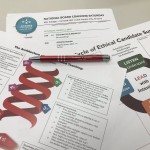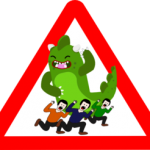It is with incredible frequency that I hear the axiom that a teacher should be a “guide on the side, not a sage on a stage”. It has been so often repeated that it is rarely even questioned; which means it absolutely should be questioned.
Essentially, it means that the goal of teaching should be to shepherd students to knowledge on their own terms (guiding on the side), rather than on the teacher’s terms (sage on the stage). This is perfectly reasonable. After all, student-centeredness can help hone critical-thinking and self-reflection skills, as well as allowing students to ask questions directly related to their individual needs. [1] [2] [3]
The immediate problem, however, is the either/or dichotomy in which it’s presented. It’s made to seem as if teachers must make a choice between either teacher-centered or student-centered learning. But how can students explore a concept if they haven’t been given the foundation to explore it?
There is another problem here, but it is more subtle: both equally assert the concept of teacher-as-guru. Whether a sage or a Sherpa, the implication is that students are still wholly reliant, the only difference is the degree of perceived freedom.
I’m not saying that these aren’t necessary and useful educational tools. What I am saying is that they are incomplete. Of course students should feel that they have agency in their learning, but they also need to have agency over their learning.
Students, by and large, are conditioned into believing they need a teacher — not only in the form of guidance and information, but also in validation (think smiley faces and gold stars). It’s all a very nice clean loop wherein the teacher gives some kernel to students, and the students make something from it to give back. The issue with this, as with any cycle, is that there is no terminus. It doesn’t lead anywhere, it just repeats. As a result, students are unprepared to process information outside of a classroom setting. How then do we prepare them for post-academic life?
I welcome you now to Thunderdome.
For Paul Ricoeur, the interaction between subject and interpretable object creates an “ontology of understanding”. For Vladimir Alexandrov, all inquiry must establish a “matrix of meaning”. The intersection of these two ideas form the crux of what I’ve come to call Thunderdome. It gained the name after several teachers and administrators asked why my classroom seemed so chaotic.
“Because it is. We’re doing some Mad Max stuff right now. It gets messy.”
Luckily I’m in good enough standing that this piqued more interest than concern.
In essence, Thunderdome is a crucible of ideas where, instead of focusing on a “right” or even “best” interpretation of a subject (either guided or given), students are tasked with exhausting all possible interpretations (Alexandrov) then critically and logically pitting them each against the other to derive hermeneutic meaning (Ricoeur). This is not a clean, bounded, academic exercise. It is chaotic, messy, visceral. We attack and dissect ideas to find meaning any way we can, desperately and with vigor.
To me, the goal of teaching is to make myself unnecessary, and this is the best way I’ve found so far to break the traditional student-teacher codependency paradigm; it pushes students to engage the skills necessary to methodically and autonomously collaborate, research, engage, evaluate, and challenge any and all ideas that they encounter within a safe space and in an objective way (ensuring these last two is really my only contribution to the process). Given the current timbre of our political discourse, I believe these skills are more necessary than ever. My scheme is imperfect, but it’s a start.
Ostensibly the purpose of education should be to create an autonomous citizenry, but the actual trajectory of education seems to be designed against this. I firmly believe, however, that it is possible to change this trajectory and allow students to utilize tools they inherently possess in order to thrive independently after ageing-out of the structured dependency on which they have been raised.








